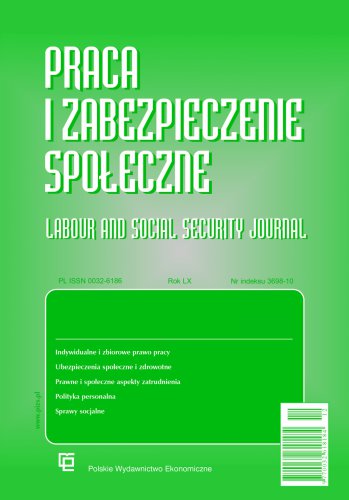Occasional remote work — problems with calculating of the period of occasional remote work for part-time employees and employed during the calendar year in the context of the draft amendment to the Polish Labour Code
The government draft of the act amending the Labour Code and other acts on, among others, the introduction of remote work institution to the Labour Code, published on the Sejm's website due to the ongoing parliamentary work, provides for the possibility of performing remote work occasionally (occasional remote work). This form of work is to be allowed for 24 days in a calendar year. The proposed regulation does not directly refer to the situation of a part-time employee or employee who commences work during the year. As a consequence, the question arises whether the scope of this right is proportionally reduced. In addition, since this is an annual right related to the employee, should the information on the number of days worked in this form be reflected in the employment certificate in the event of termination of the employment relationship? The analysis carried out in the article allows for the conclusion that the principle of proportionality should be applied in both of the indicated cases, and the employer should indicate in the work certificate the number of days of occasional remote work.
References
Bibliografia/References
Barnard, C. (2012). EU Employment Law. Oxford University Press.
Bigaj, A. (2015). Prawo do urlopu wypoczynkowego. Wolters Kluwer.
Bomba, K. (2014). The principle of non-discrimination against part-time workers in the light of the Council Directive 97/81/EC concerning the Framework Agreement on part-time work. Journal of Modern Science, 20(1).
Eurofound (2020). The Right to Disconnect in the 27 EU Member States. https://www.eurofound.europa.eu/sites/default/files/wpef20019.pdf (dostęp: 8.08.2022 r.)
Florek, L. (2017). Kodeks pracy. Komentarz. Wolters Kluwer.
Gładoch, M. (2020). Praca zdalna w praktyce. Zagadnienia prawne. Pedagogium Wyższa Szkoła Nauk Społecznych.
Jaroszerwska-Ignatowska, I. (2018). Zatrudnienie w niepełnym wymiarze czasu pracy. Wolters Kluwer.
Kosut, A. (2020). W K. W. Baran (Red.), Kodeks pracy. Komentarz. Wolters Kluwer.
Mitrus, L. (2020a). Praca zdalna de lege lata i de lege ferenda — zmiana miejsca wykonywania pracy czy nowa koncepcja stosunku pracy? Część 1. Praca i Zabezpieczenie Społeczne, (10). https://doi.org/10.33226/0032-6186.2020.10.1
Mitrus, L. (2020b). Praca zdalna de lege lata i de lege ferenda — zmiana miejsca wykonywania pracy czy nowa koncepcja stosunku pracy? Część 2. Praca i Zabezpieczenie Społeczne, (11). https://doi.org/10.33226/0032-6186.2020.11.1
Pisarczyk, Ł. (2017). W L. Florek (Red.), Kodeks pracy. Komentarz. Wolters Kluwer.
Kiss, G. (2014). 97/81/EC: Part Time Work. W M. Schlachter (Red.), EU Labour Law. A commentary. Wolters Kluwer Law & Business.
Rycak, M. (2021). W K. Walczak (Red.), Kodeks pracy. Komentarz. C.H.Beck.
Świątkowski, A. (2015). Prawo pracy Unii Europejskiej. C.H.Beck.
Świątkowski, A. (2018). Kodeks pracy. Komentarz. C.H.Beck.
Tomaszewska, M. (2020) W K. W. Baran (Red.), Kodeks pracy. Komentarz. Wolters Kluwer.
Wratny, J. (2015). Z problematyki prawnej zatrudnienia w niepełnym wymiarze czasu pracy, Studia Iuridica Lublinensia, XXIV(3).

